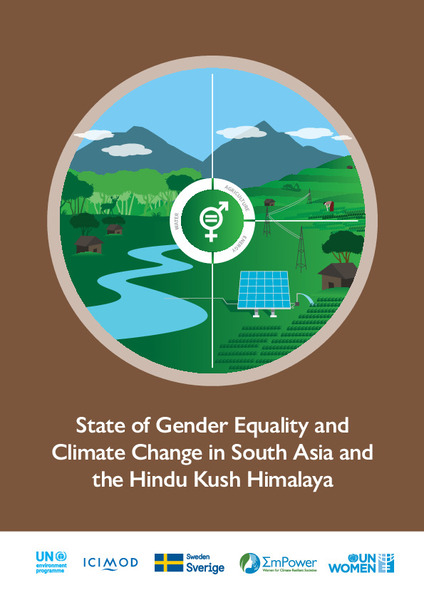State of Gender Equality and Climate Change in South Asia and the Hindu Kush-Himalayan Region
| dc.contributor | Asia & Pacific Office | en_US |
| dc.contributor.author | International Centre for Integrated Mountain Development | en_US |
| dc.contributor.other | United Nations Environment Programme | en_US |
| dc.contributor.other | United Nations Entity for Gender Equality and the Empowerment of Women | en_US |
| dc.contributor.other | Goodrich, Chanda Gurung | en_US |
| dc.contributor.other | Hussain, Abid | en_US |
| dc.contributor.other | Pasakhala, Binaya | en_US |
| dc.contributor.other | Bano, Kosar | en_US |
| dc.contributor.other | Bhuchar, Sanjeev | en_US |
| dc.contributor.other | Chitale, Vishwas Sudhir | en_US |
| dc.contributor.other | Bisht, Suman | en_US |
| dc.contributor.other | Bastola, Aditya | en_US |
| dc.contributor.other | Silpakar, Simran | en_US |
| dc.coverage.spatial | Asia and the Pacific | en_US |
| dc.coverage.spatial | Afghanistan | en_US |
| dc.coverage.spatial | Bangladesh | en_US |
| dc.coverage.spatial | Bhutan | en_US |
| dc.coverage.spatial | China | en_US |
| dc.coverage.spatial | India | en_US |
| dc.coverage.spatial | Maldives | en_US |
| dc.coverage.spatial | Myanmar | en_US |
| dc.coverage.spatial | Nepal | en_US |
| dc.coverage.spatial | Pakistan | en_US |
| dc.coverage.spatial | Sri Lanka | en_US |
| dc.date.accessioned | 2022-10-19T06:28:55Z | |
| dc.date.available | 2022-10-19T06:28:55Z | |
| dc.date.issued | 2022-09 | |
| dc.identifier.uri | https://wedocs.unep.org/20.500.11822/40859 | |
| dc.description | South Asia and the Hindu Kush Himalaya (HKH) are among the regions that are most vulnerable to the impacts of climate change. Its adverse impacts are worsening and becoming more evident here. The impacts of climate change are leading to severe consequences such as increased food insecurity, poverty, and social and gender inequalities. Through a cyclical relation, these consequences are also the root causes of climate vulnerability. Reducing climate risks demands that we address these root causes. An understanding of gender equality and social inclusion (GESI), among other issues, is central to understanding people’s capacities to cope with and adapt to climate change induced impacts, including recognising the prevalence of patriarchal systems in most South Asian and HKH countries. The main goal of this assessment is to provide evidence to support the development and implementation of gender-responsive climate policies and programmes at the country level as well as improve regional cooperation towards this end in South Asia and the HKH. In this regard, the report assesses the state of gender equality and climate change by analysing three climate-affected sectors – agriculture, water, and energy (with a focus on renewable energy). The assessment covers all 10 countries which fall in South Asia and the HKH – Afghanistan, Bangladesh, Bhutan, China, India, Maldives, Myanmar, Nepal, Pakistan, and Sri Lanka. | en_US |
| dc.description.uri | https://lib.icimod.org/record/35996 | en_US |
| dc.format | Text | en_US |
| dc.language | English | en_US |
| dc.publisher | International Centre for Integrated Mountain Development | en_US |
| dc.rights | Public | en_US |
| dc.subject | climate change | en_US |
| dc.subject | gender equality | en_US |
| dc.subject | energy | en_US |
| dc.subject | renewable energy | en_US |
| dc.subject | agriculture | en_US |
| dc.subject | climate change impact | en_US |
| dc.subject | water | en_US |
| dc.subject | South Asia | en_US |
| dc.subject | Afghanistan | en_US |
| dc.subject | Bangladesh | en_US |
| dc.subject | Bhutan | en_US |
| dc.subject | China | en_US |
| dc.subject | India | en_US |
| dc.subject | Maldives | en_US |
| dc.subject | Myanmar | en_US |
| dc.subject | Nepal | en_US |
| dc.subject | Pakistan | en_US |
| dc.subject | Sri Lanka | en_US |
| dc.title | State of Gender Equality and Climate Change in South Asia and the Hindu Kush-Himalayan Region | en_US |
| wd.identifier.sdg | SDG 5 - Gender Equality | en_US |
| wd.identifier.sdg | SDG 7 - Affordable and Clean Energy | en_US |
| wd.identifier.sdg | SDG 13 - Climate Action | en_US |


